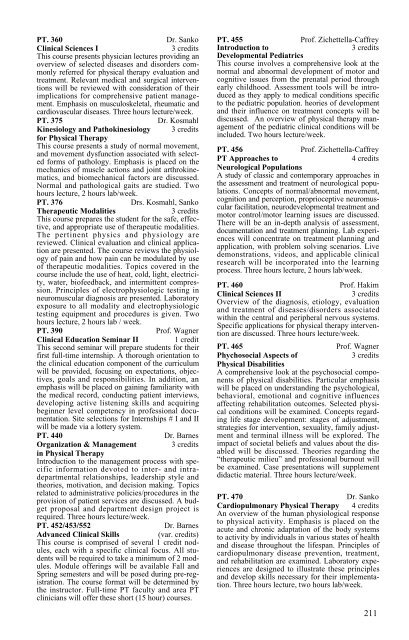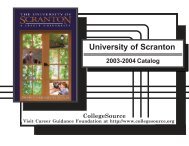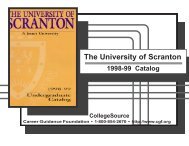You also want an ePaper? Increase the reach of your titles
YUMPU automatically turns print PDFs into web optimized ePapers that Google loves.
PT. 360 Dr. Sanko<br />
Clinical Sciences I 3 credits<br />
This course presents physician lectures providing an<br />
overview <strong>of</strong> selected diseases and disorders commonly<br />
referred for physical therapy evaluation and<br />
treatment. Relevant medical and surgical interventions<br />
will be reviewed with consideration <strong>of</strong> their<br />
implications for comprehensive patient management.<br />
Emphasis on musculoskeletal, rheumatic and<br />
cardiovascular diseases. Three hours lecture/week.<br />
PT. 375 Dr. Kosmahl<br />
Kinesiology and Pathokinesiology 3 credits<br />
for Physical <strong>The</strong>rapy<br />
This course presents a study <strong>of</strong> normal movement,<br />
and movement dysfunction associated with selected<br />
forms <strong>of</strong> pathology. Emphasis is placed on the<br />
mechanics <strong>of</strong> muscle actions and joint arthrokinematics,<br />
and biomechanical factors are discussed.<br />
Normal and pathological gaits are studied. Two<br />
hours lecture, 2 hours lab/week.<br />
PT. 376 Drs. Kosmahl, Sanko<br />
<strong>The</strong>rapeutic Modalities 3 credits<br />
This course prepares the student for the safe, effective,<br />
and appropriate use <strong>of</strong> therapeutic modalities.<br />
<strong>The</strong> pertinent physics and physiology are<br />
reviewed. Clinical evaluation and clinical application<br />
are presented. <strong>The</strong> course reviews the physiology<br />
<strong>of</strong> pain and how pain can be modulated by use<br />
<strong>of</strong> therapeutic modalities. Topics covered in the<br />
course include the use <strong>of</strong> heat, cold, light, electricity,<br />
water, bi<strong>of</strong>eedback, and intermittent compression.<br />
Principles <strong>of</strong> electrophysiologic testing in<br />
neuromuscular diagnosis are presented. Laboratory<br />
exposure to all modality and electrophysiologic<br />
testing equipment and procedures is given. Two<br />
hours lecture, 2 hours lab / week.<br />
PT. 390 Pr<strong>of</strong>. Wagner<br />
Clinical Education Seminar II 1 credit<br />
This second seminar will prepare students for their<br />
first full-time internship. A thorough orientation to<br />
the clinical education component <strong>of</strong> the curriculum<br />
will be provided, focusing on expectations, objectives,<br />
goals and responsibilities. In addition, an<br />
emphasis will be placed on gaining familiarity with<br />
the medical record, conducting patient interviews,<br />
developing active listening skills and acquiring<br />
beginner level competency in pr<strong>of</strong>essional documentation.<br />
Site selections for Internships # I and II<br />
will be made via a lottery system.<br />
PT. 440 Dr. Barnes<br />
Organization & Management 3 credits<br />
in Physical <strong>The</strong>rapy<br />
Introduction to the management process with specific<br />
information devoted to inter- and intradepartmental<br />
relationships, leadership style and<br />
theories, motivation, and decision making. Topics<br />
related to administrative policies/procedures in the<br />
provision <strong>of</strong> patient services are discussed. A budget<br />
proposal and department design project is<br />
required. Three hours lecture/week.<br />
PT. 452/453/552 Dr. Barnes<br />
Advanced Clinical Skills (var. credits)<br />
This course is comprised <strong>of</strong> several 1 credit nodules,<br />
each with a specific clinical focus. All students<br />
will be required to take a minimum <strong>of</strong> 2 modules.<br />
Module <strong>of</strong>ferings will be available Fall and<br />
Spring semesters and will be posed during pre-registration.<br />
<strong>The</strong> course format will be determined by<br />
the instructor. Full-time PT faculty and area PT<br />
clinicians will <strong>of</strong>fer these short (15 hour) courses.<br />
PT. 455 Pr<strong>of</strong>. Zichettella-Caffrey<br />
Introduction to 3 credits<br />
Developmental Pediatrics<br />
This course involves a comprehensive look at the<br />
normal and abnormal development <strong>of</strong> motor and<br />
cognitive issues from the prenatal period through<br />
early childhood. Assessment tools will be introduced<br />
as they apply to medical conditions specific<br />
to the pediatric population. heories <strong>of</strong> development<br />
and their influence on treatment concepts will be<br />
discussed. An overview <strong>of</strong> physical therapy management<br />
<strong>of</strong> the pediatric clinical conditions will be<br />
included. Two hours lecture/week.<br />
PT. 456 Pr<strong>of</strong>. Zichettella-Caffrey<br />
PT Approaches to 4 credits<br />
Neurological Populations<br />
A study <strong>of</strong> classic and contemporary approaches in<br />
the assessment and treatment <strong>of</strong> neurological populations.<br />
Concepts <strong>of</strong> normal/abnormal movement,<br />
cognition and perception, proprioceptive neuromuscular<br />
facilitation, neurodevelopmental treatment and<br />
motor control/motor learning issues are discussed.<br />
<strong>The</strong>re will be an in-depth analysis <strong>of</strong> assessment,<br />
documentation and treatment planning. Lab experiences<br />
will concentrate on treatment planning and<br />
application, with problem solving scenarios. Live<br />
demonstrations, videos, and applicable clinical<br />
research will be incorporated into the learning<br />
process. Three hours lecture, 2 hours lab/week.<br />
PT. 460 Pr<strong>of</strong>. Hakim<br />
Clinical Sciences II 3 credits<br />
Overview <strong>of</strong> the diagnosis, etiology, evaluation<br />
and treatment <strong>of</strong> diseases/disorders associated<br />
within the central and peripheral nervous systems.<br />
Specific applications for physical therapy intervention<br />
are discussed. Three hours lecture/week.<br />
PT. 465 Pr<strong>of</strong>. Wagner<br />
Phychosocial Aspects <strong>of</strong> 3 credits<br />
Physical Disabilities<br />
A comprehensive look at the psychosocial components<br />
<strong>of</strong> physical disabilities. Particular emphasis<br />
will be placed on understanding the psychological,<br />
behavioral, emotional and cognitive influences<br />
affecting rehabilitation outcomes. Selected physical<br />
conditions will be examined. Concepts regarding<br />
life stage development: stages <strong>of</strong> adjustment,<br />
strategies for intervention, sexuality, family adjustment<br />
and terminal illness will be explored. <strong>The</strong><br />
impact <strong>of</strong> societal beliefs and values about the disabled<br />
will be discussed. <strong>The</strong>ories regarding the<br />
“therapeutic milieu” and pr<strong>of</strong>essional burnout will<br />
be examined. Case presentations will supplement<br />
didactic material. Three hours lecture/week.<br />
PT. 470 Dr. Sanko<br />
Cardiopulmonary Physical <strong>The</strong>rapy 4 credits<br />
An overview <strong>of</strong> the human physiological response<br />
to physical activity. Emphasis is placed on the<br />
acute and chronic adaptation <strong>of</strong> the body systems<br />
to activity by individuals in various states <strong>of</strong> health<br />
and disease throughout the lifespan. Principles <strong>of</strong><br />
cardiopulmonary disease prevention, treatment,<br />
and rehabilitation are examined. Laboratory experiences<br />
are designed to illustrate these principles<br />
and develop skills necessary for their implementation.<br />
Three hours lecture, two hours lab/week.<br />
211
















